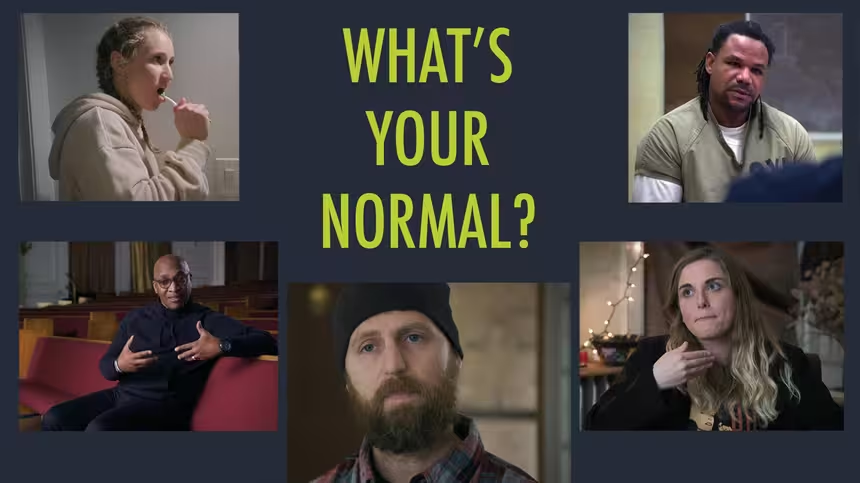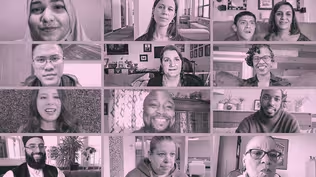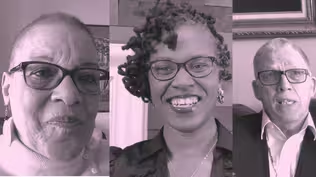
Drs. Fosters-Circle of Life | Decolonizing Mental Health
Special | 3m 24sVideo has Closed Captions
Native psychologists push for a move away from self and into the circularity of nature.
Drs. Dan and Rebecca Crawford Foster’s psychology practice doesn’t revolve around an individualistic idea of human beings. They believe that no identity of self can exist without a social context. Discarding the Western psychology, they embrace Native belief in the relational circle to help people heal so they can continue to be part of a joyful community bond that transcends generations.
Problems playing video? | Closed Captioning Feedback
Problems playing video? | Closed Captioning Feedback
Funding for Mysteries of Mental Illness is provided by the Corporation for Public Broadcasting, Johnson & Johnson, the American Psychiatric Association Foundation, and Draper, and through the support of PBS...

Drs. Fosters-Circle of Life | Decolonizing Mental Health
Special | 3m 24sVideo has Closed Captions
Drs. Dan and Rebecca Crawford Foster’s psychology practice doesn’t revolve around an individualistic idea of human beings. They believe that no identity of self can exist without a social context. Discarding the Western psychology, they embrace Native belief in the relational circle to help people heal so they can continue to be part of a joyful community bond that transcends generations.
Problems playing video? | Closed Captioning Feedback
How to Watch Mysteries of Mental Illness
Mysteries of Mental Illness is available to stream on pbs.org and the free PBS App, available on iPhone, Apple TV, Android TV, Android smartphones, Amazon Fire TV, Amazon Fire Tablet, Roku, Samsung Smart TV, and Vizio.

Join the Campaign
Share your story of dealing with mental illness through textual commentary, a still image, a short-form video — however you feel most comfortable — using the hashtag #MentalHealthPBS on social media.- [Dr. Rebecca Foster] I was talking to him and I said, you know grandpa, I said, nobody really wants me to go.
They want me to stay, they're afraid that when I leave that I'm gonna be changed too much.
He said, that's true, you're gonna come back, you're not gonna be the same, but you're going to be the modern warrior.
He said, you're gonna prevent our people from having everything taken and not being here any longer.
(gentle music) - [Dr. Dan Foster] I did not encounter any other American Indians in my graduate studies.
There were other American Indians in graduate studies, and this was before the days of cell phones.
We knew who each other were.
(laughing) When I learned about the brain I was amazed to find that every gyri and sulci, every dip and bump on your brain is named after a white man.
(laughing) There's no Crazy Horse Junction, or Sitting Bull Corner in your brain.
It's all named after white males because white males were the docs back when they started cutting into people's brains.
They named and labeled everything.
Our world was nature, our world still is nature.
We learn from nature.
We have a holistic view of life.
We don't view human beings in the linear way.
As on top of a totem pole, we view in a circular ways, human beings being the last to be created.
The last to arrive here on earth.
In Western European, it was all about me.
And so psychology is about the study of the individual.
How are you going to have an individual outside of the social context?
You don't even have a sense of identity without how people respond to you.
So even your sense of me and your sense of I can't exist without a social context, without other people responding to you.
And you taking information from that.
We have a lot of life-ways, and a lot of perspectives that are healthy, very healthy for community living.
And so what we didn't use the circle technologically, we used the circle, relationally.
The concept of Cangleska Wakan, the sacred circle of life, the multiple dimensions of life to include not just those that are alive now, but those that will follow us when you'd be making decisions for the group of people.
We didn't aspire to progress.
We aspire to continue the circle of life.
I bring that up because we live not just that the people today will live, live because the people that preceded us lived, and they live through us, literally genetically, and the people that aren't here yet, we live so they'll live.
Not just as human beings, but as Salonga Lakota and as Siksikaitsitapi, as human beings with the specific way of seeing and engaging and understanding and relating with the world.
And so we, we delight to be a part of the continuation of that.
(gentle music)

- Science and Nature

Explore scientific discoveries on television's most acclaimed science documentary series.

- Science and Nature

Capturing the splendor of the natural world, from the African plains to the Antarctic ice.












Support for PBS provided by:
Funding for Mysteries of Mental Illness is provided by the Corporation for Public Broadcasting, Johnson & Johnson, the American Psychiatric Association Foundation, and Draper, and through the support of PBS...

